A complete and accurate collection of A2 vocabulary
A2 vocabulary is easy yet commonly used English words in daily conversations. For efficient communication, students should widen their A2 vocabulary range. Let’s check those words out with PREP in the below article.

I. A complete and accurate collection of A2 vocabulary by common topics
In the below tables, PREP has collected and compiled the most comprehensive lists of A2 English vocabulary categorized by common topics. In addition, those tables also include the meanings and word types so that you can understand how to use these words clearly!
1. Greetings
Let’s join PREP to discover some greetings in English in A2 vocabulary list.
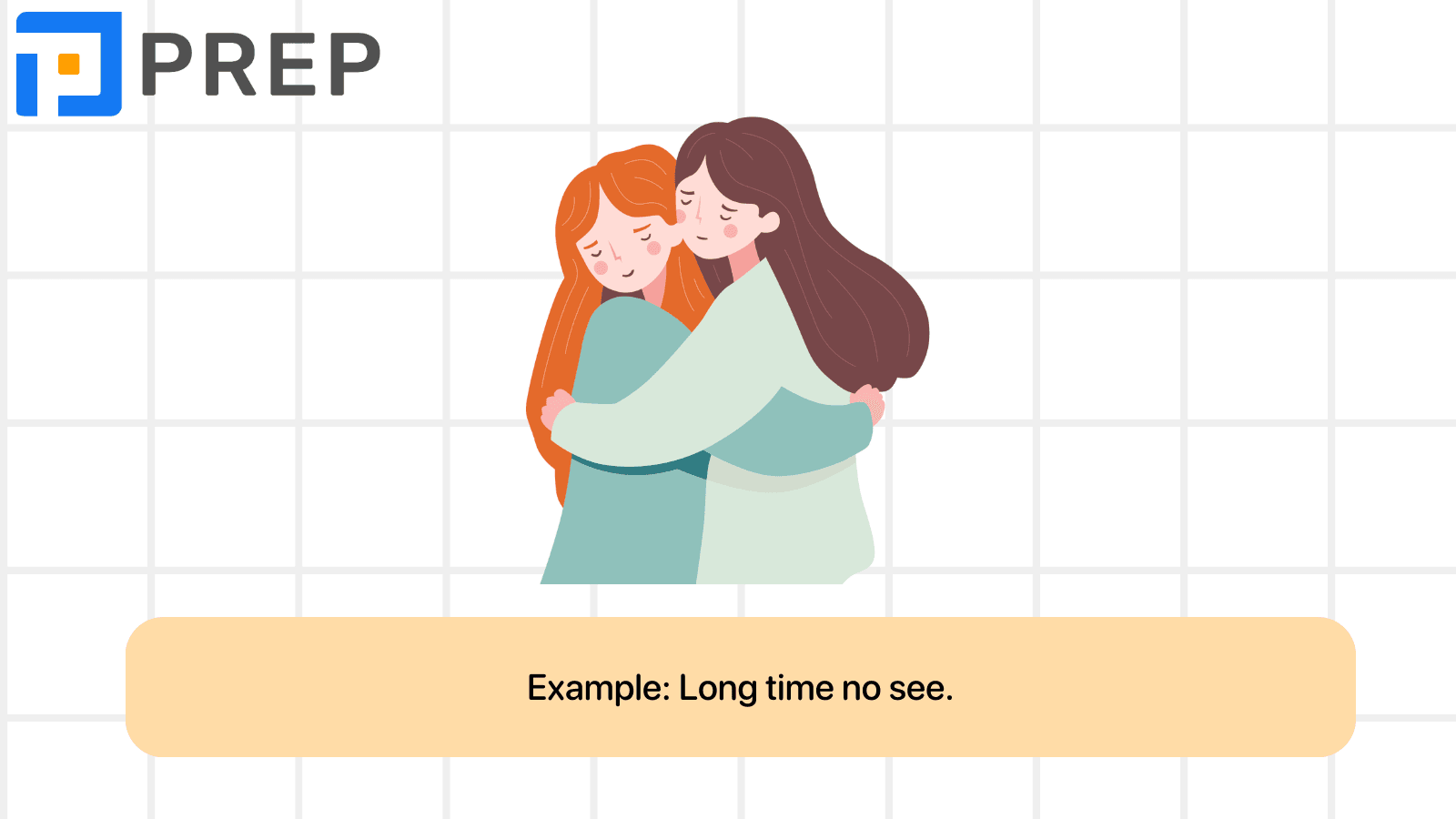
- How do you do?
- (I’m) pleased to meet you.
- Long time no see.
- Good day.
- How are things?
- How’s life (treating you)?
2. Time and seasons
When it comes to the topic of time, let's join PREP to find out how many A2-level English words are related to this topic, shall we?
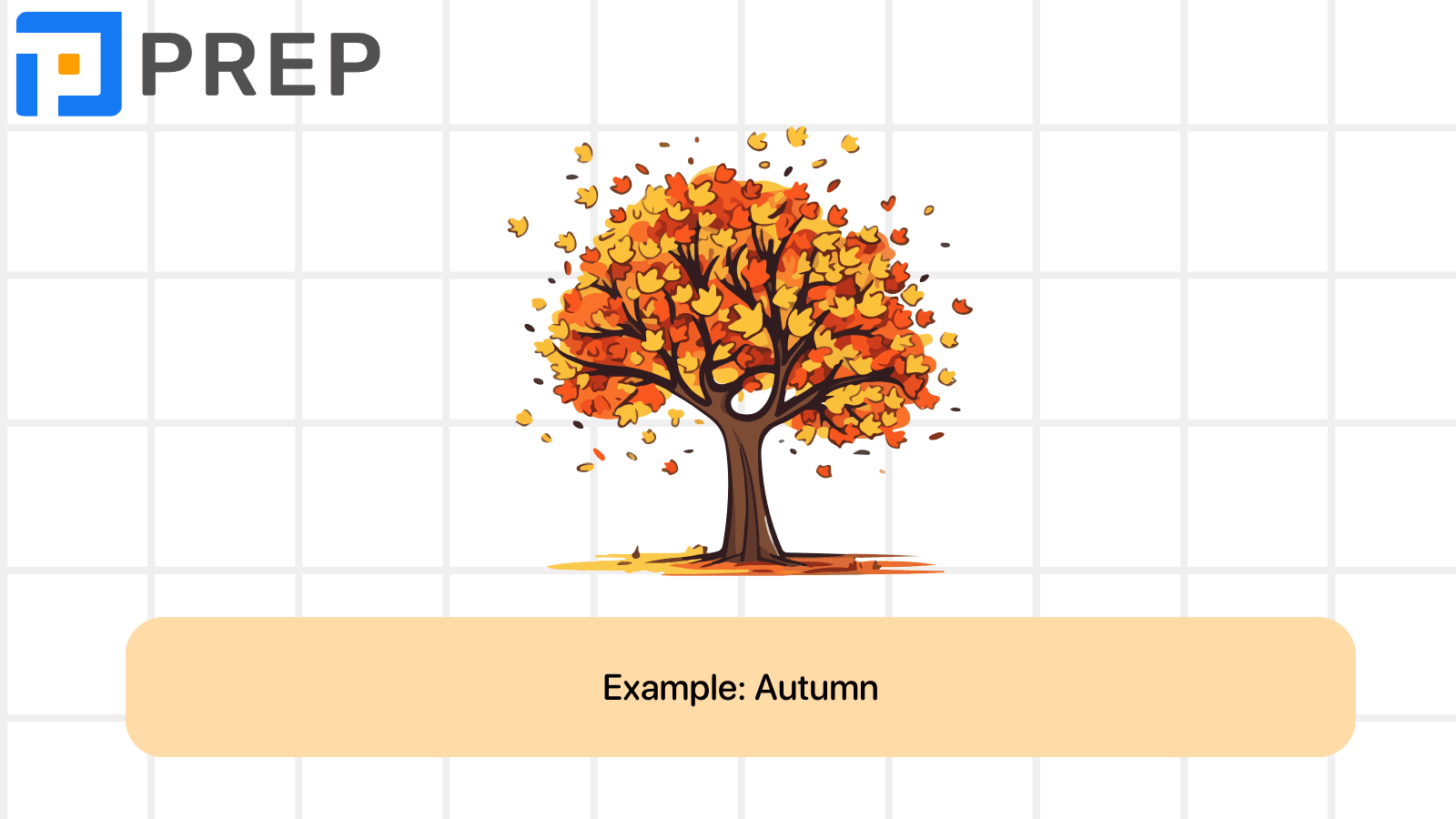
|
A2 vocabulary: Time and seasons |
|
|
Spring (n): the season between winter and summer when plants begin to grow |
Daily (adv): happening, done or produced every day |
|
Summer (n): the warmest season of the year, coming between spring and autumn |
Immediately (adv): without delay |
|
Autumn (n): the season of the year between summer and winter, when leaves change color and the weather becomes colder |
Suddenly (adv): quickly and unexpectedly |
|
Winter (n): the coldest season of the year, between autumn and spring |
Recent (adv): that happened or began only a short time ago |
|
Fog (n): a thick cloud of very small drops of water in the air close to the land or sea that is very difficult to see through |
Regular (adv): following a pattern, especially with the same time or space in between each thing and the next |
|
Storm (n): very bad weather with strong winds and rain, and often thunder and lightning |
Since (adv): from a time in the past until a later past time, or until now |
|
Typhoon (n): a violent tropical storm with very strong winds |
Yet (adv): used in negative sentences and questions to talk about something that has not happened but that you expect to happen |
|
Before (pre): earlier than somebody/something |
Later (adv): at a time in the future; after the time you are talking about |
|
After (pre): later than something; following something in time |
All the time (adv): during the whole of a particular period of time |
3. Foods & Drinks
Food and drinks are one of the common topics in daily life. Let's join PREP to learn vocabulary for A2 related to this topic, shall we?
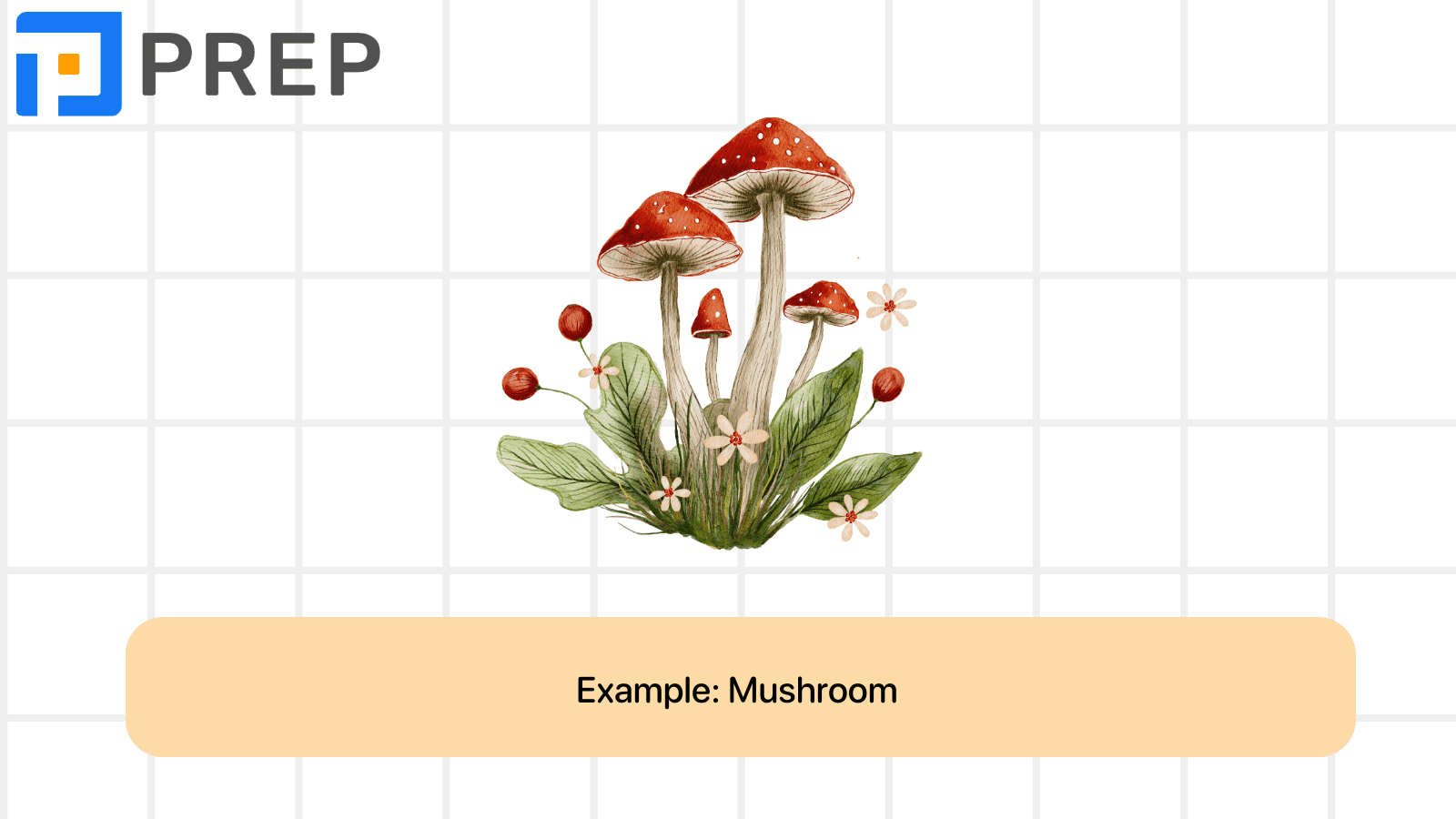
|
A2 vocabulary: Foods & Drinks |
|
| Book (v): to arrange for somebody to have a seat on a plane, etc. | Jam (n): a thick sweet substance made by boiling fruit with sugar, often sold in jars and spread on bread |
| Check (n): a piece of paper that shows how much you have to pay for the food and drinks that you have had in a restaurant | Mushroom (n): a fungus with a round flat head and short stem. Many mushrooms can be eaten. |
| Eat out (v): to have a meal in a restaurant, etc. rather than at home | Nut (n): a small hard fruit with a very hard shell that grows on some trees |
| Order (v): to ask for something to eat or drink in a restaurant, bar, etc. | Pasta (n): an Italian food made from flour, water and sometimes eggs, formed into different shapes and usually served with a sauce. It is hard when dry and soft when cooked. |
| Serve (v): to give somebody food or drink, for example at a restaurant or during a meal | Pie (n): a baked dish of fruit or meat and/or vegetables with pastry on the bottom, sides and top |
| Chef (n): a person whose job is to cook, especially the most senior person in a restaurant, hotel, etc. | Soup (n): a liquid food made by boiling meat, vegetables, etc. in water, often eaten as the first course of a meal |
| Cook (n): a person who cooks food or whose job is cooking | Sausage (n): a mixture of meat, fat, bread, etc. cut into small pieces, put into a long tube of skin, cooked and eaten whole or served cold in thin slices |
| Bean (n): a seed, or pod containing seeds, of a climbing plant, eaten as a vegetable. There are several types of bean and the plants that they grow on are also called beans. | Toast (n): slices of bread that have been made brown and dry by heating them on both sides in a toaster or under a grill |
| Beef (n): meat that comes from a cow | Hot chocolate (n): a drink made by mixing chocolate powder with hot water or milk; a cup of this drink |
| Pork (n): meat from a pig that has not been cured (= preserved using salt or smoke) | Honey (n): a sweet, sticky yellow-brown substance made by bees that is spread on bread, etc. like jam |
| Candy (n): sweet food made of sugar and/or chocolate, eaten between meals; a piece of this | Biscuit (n): a small flat dry cake for one person, usually sweet, and baked until hard |
| Cookie (n): a small flat sweet cake for one person, usually baked until hard and dry | Butter (n): a soft yellow food made from cream, used in cooking and for spreading on bread |
| Chips (n): a long thin piece of potato fried in oil or fat | Cereal (n): one of various types of grass that produce grains that can be eaten or are used to make flour or bread. wheat, barley and rye are all cereals. |
| Hot dog (n): a hot sausage served in a long bread roll | Chopstick (n): either of a pair of thin sticks that are used for eating with, especially in East Asian countries |
| Hamburger (n): beef cut into small pieces and made into a flat round shape that is then fried, often served in a bread roll | Cut (v): to make an opening or a wound in something, especially with a sharp tool such as a knife or scissors |
| Pizza (n): an Italian dish consisting of a flat round bread base with cheese, tomatoes, vegetables, meat, etc. on top | Pepper (n): a powder made from dried berries (called peppercorns), used to give a hot, spicy taste to food |
| Recipe (n): a set of instructions that tells you how to cook something and the ingredients (= items of food) you need for it | Salt (n): a white substance that is added to food to make it taste better or to preserve it. Salt is obtained from mines and is also found in seawater. It is sometimes called common salt to show that it is different from other chemical salts. Its chemical name is sodium chloride. |
| Cooker (n): a large piece of equipment for cooking food, containing an oven and gas or electric rings on top | Sugar (n): a sweet substance, often in the form of white or brown crystals, made from the juices of various plants, used in cooking or to make tea, coffee, etc. sweeter |
| Oven (n): the part of a cooker that is like a box with a door on the front, in which food is cooked or heated | Boil (v): when a liquid boils or when you boil it, it is heated to the point where it forms bubbles and turns to steam or vapour |
| Bowl (n): a deep round dish with a wide open top, used especially for holding food or liquid | Heat (n): the quality of being hot |
| Fork (n): a tool with a handle and three or four sharp points (called prongs), used for picking up and eating food | Taste (v): to be able to recognize tastes in food and drink |
| Plate (n): a flat, usually round, dish that you put food on | |
| Spoon (n): a tool that has a handle with a shallow bowl at the end, used for mixing, serving and eating food | |
| Knife (n): with a handle, used for cutting or as a weapon | |
4. Family
Let’s accompany PREP on uncovering which A2 vocabulary is related to the family - a familiar topic with each of us!
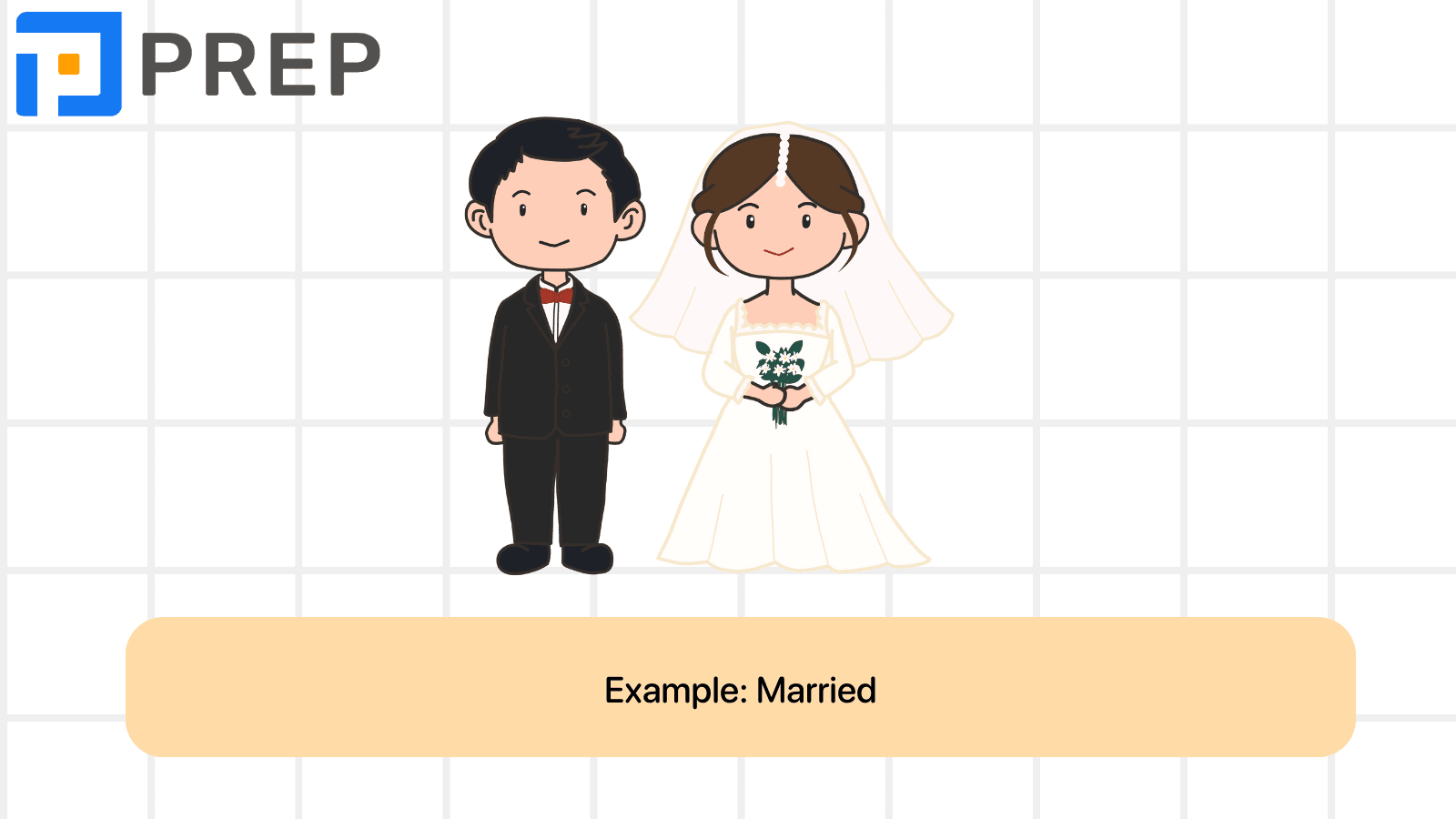
|
A2 vocabulary: Family |
|
| Married (adj): đhaving a husband or wife | Screen (n): the flat surface at the front of a television, computer, or other electronic device, on which you see pictures or information |
| Surname (n): a name shared by all the members of a family (written last in English names) | Stamp (n): a small piece of paper with a design on it that you buy and stick on an envelope or a package before you post it |
| Brush (v): to clean, polish or make something smooth with a brush | Telephone (n): a system for talking to somebody else over long distances, using wires or radio; a machine used for this |
| Comb (n): a flat piece of plastic or metal with a row of thin teeth along one side, used for making your hair neat; a smaller version of this worn by women in their hair to hold it in place or as a decoration | Fridge (n): a piece of electrical equipment in which food is kept cold so that it stays fresh |
| Cushion (n): a cloth bag filled with soft material or feathers that is used, for example, to make a seat more comfortable | Shelf (n): a flat board, made of wood, metal, glass, etc., fixed to the wall or forming part of a cupboard, bookcase, etc., for things to be placed on |
| Diary (n): a book in which you can write down the experiences you have each day, your private thoughts, etc. | Shampoo (n): a liquid soap that is used for washing your hair; a similar liquid used for cleaning carpets, furniture covers or a car |
| Entrance (n): a door, gate, passage, etc. used for entering a room, building or place | Soap (n): a substance that you use with water for washing your body |
| Gate (n): a barrier like a door that is used to close an opening in a fence or a wall outside a building | Key (n): a piece of metal with a special shape used for locking a door, starting a car, etc. |
5. Work
Let’s check out types of jobs in the below A2 vocabulary table with PREP!
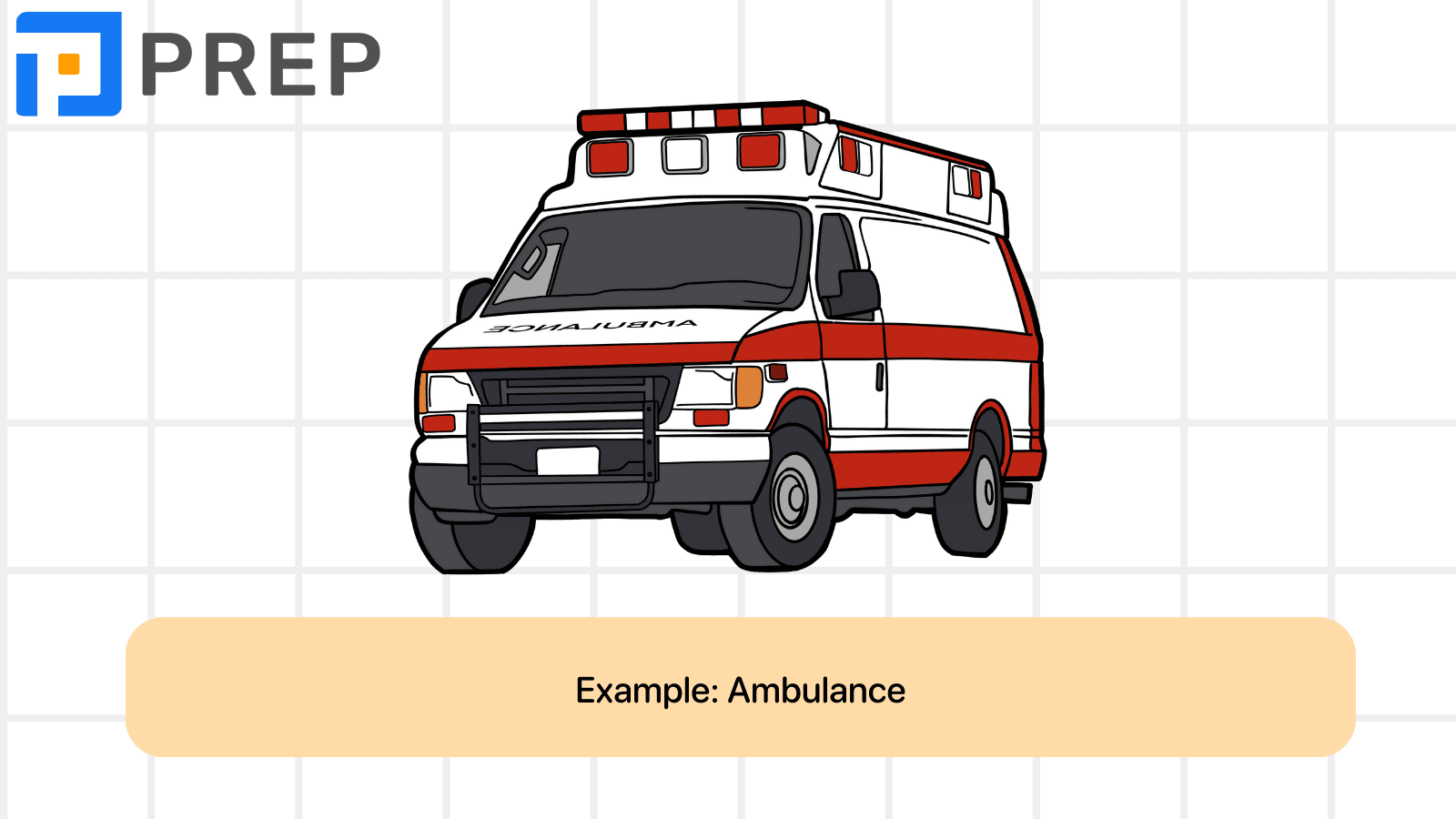
|
A2 vocabulary: Work |
|
| Pilot (n): a person who operates the controls of an aircraft, especially as a job | Airport (n): a place where planes land and take off and that has buildings for passengers to wait in |
| Actor (n): a person who performs on the stage, on television or in films, especially as a profession | Meeting (n): an occasion when people come together to discuss or decide something |
| Manager (n): a person who is in charge of running a business, a shop or a similar organization or part of one | Ambulance (n): a vehicle with special equipment, used for taking sick or injured people to a hospital |
| Mechanic (n): a person whose job is repairing machines, especially the engines of vehicles | Factory (n): a building or group of buildings where goods are made, mainly by machine |
| Artist (n): a person who creates works of art, especially paintings or drawings | News (n): new information about something that has happened recently |
| Astronaut (n): a person whose job involves traveling and working in a spacecraft | Newspaper (n): a set of large printed sheets of paper, or a website, containing news, articles, advertisements, etc. and published every day or every week; the organization responsible for producing this |
| Businessman/woman (n): a man/woman who works in business, especially at a high level | Business (n): the activity of making, buying, selling or supplying goods or services for money |
| Photographer (n): a person who takes photographs, especially as a job | Police station (n): the office of a local police force |
| Designer (n): a person whose job is to decide how things such as clothes, furniture, tools, etc. will look or work by making drawings, plans or patterns | Office (n): a room, set of rooms or building where people work, usually sitting at desks |
| Engineer (n): a person whose job involves designing and building engines, machines, roads, bridges, etc. | Singer (n): a person who sings, or whose job is singing, especially in public |
| Firefighter (n): a person whose job is to put out fires | Police officer (n): a member of the police |
| Journalist (n): a person whose job is to collect and write news stories for newspapers, magazines, radio, television or online news sites | Waiter (n): a man whose job is to serve customers at their tables in a restaurant, etc. |
6. Transportation
Means of transportation and roads are familiar topics in daily life. For effective conversation, let's grasp some A2 vocabulary about transportation and roads in the table below together with PREP!
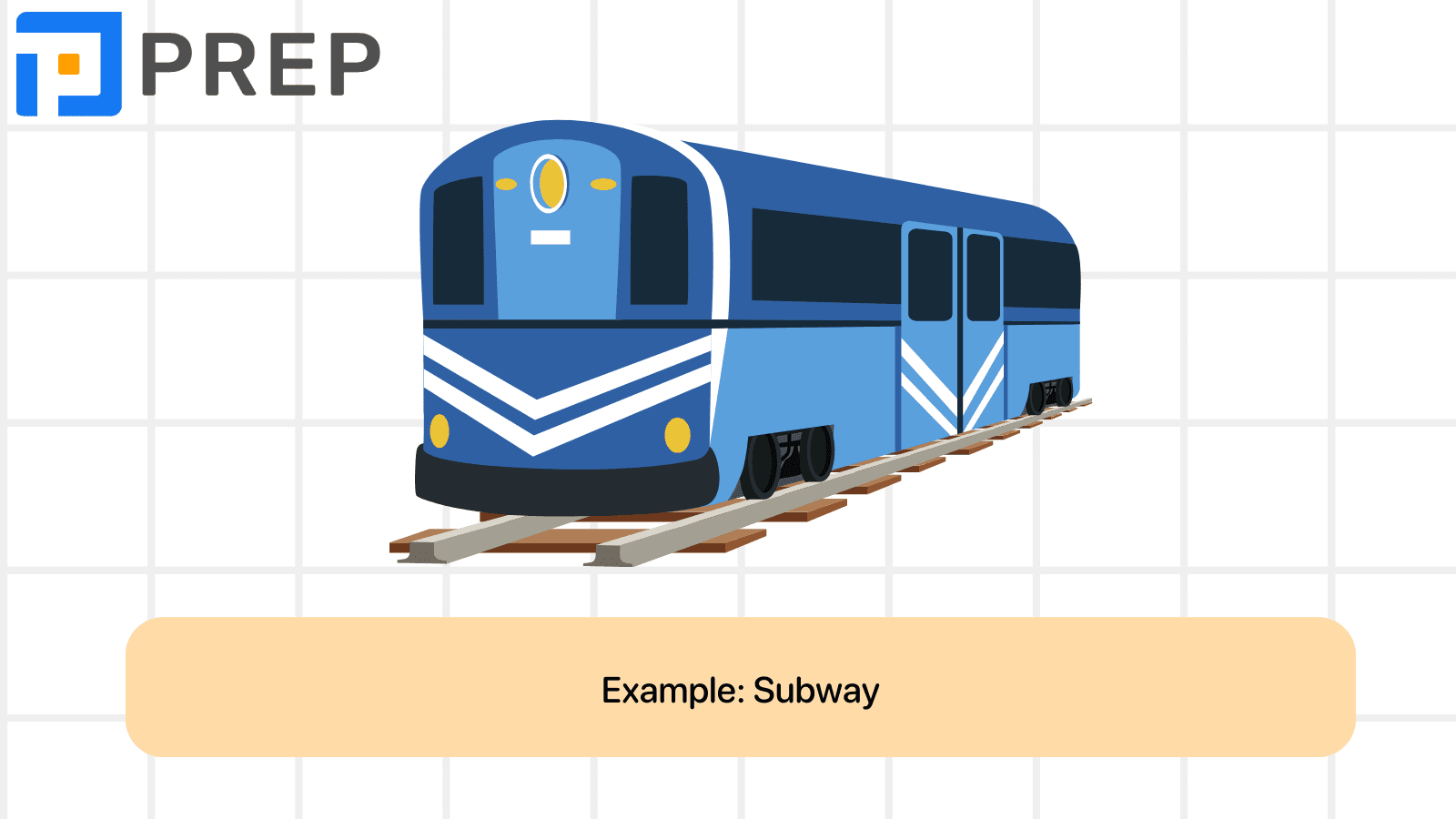
|
A2 vocabulary: Transportation |
|
| Vehicle (n): a thing that is used for transporting people or goods from one place to another, such as a car or lorry | Passenger (n): a person who is traveling in a car, bus, train, plane or ship and who is not driving it or working on it |
| Public transport (n): the system of buses, trains, etc. provided by the government or by companies, which people use to travel from one place to another | Seat (n): a place where you can sit, for example a chair |
| Metro (n): an underground train system, especially the one in Paris | Ticket (n): a printed piece of paper, or a message or image received on your phone or computer, that gives you the right to travel on a particular bus, train, etc. or to go into a theatre, etc. |
| Subway (n): an underground railway system in a city | Take off (v): to leave the ground and begin to fly |
| Underground (n): under the surface of the ground | Catch (v): to stop and hold a moving object or person, especially in your hands |
| Coach (n): a comfortable bus for carrying passengers over long distances | Engine (n): the part of a vehicle that produces power to make the vehicle move |
| Motorbike (n): a road vehicle with two wheels, driven by an engine, with one seat for the driver and often a seat for a passenger behind the driver | Line (n): a long, thin mark on a surface |
| Motorcycle (n): a road vehicle with two wheels, driven by an engine, with one seat for the driver and often a seat for a passenger behind the driver | Platform (n): the raised flat area next to the track at a train station where you get on or off the train |
| Truck (n): a large vehicle for carrying heavy loads by road | Railway (n): a track with rails on which trains run |
| Van (n): a covered vehicle with no side windows in its back half, usually smaller than a lorry, used for carrying goods or people | Route (n): a way that you follow to get from one place to another |
| Motor car (n): a car | Track (n): rails (= metal bars) that a train moves along |
| Ship (n): a large boat that carries people or goods by sea | Waiting room (n): a room where people can sit while they are waiting, for example for a bus or train, or to see a doctor or dentist |
| Airline (n): a company that provides regular flights to take passengers and goods to different places | Drive (v): to operate a vehicle so that it goes in a particular direction |
| Luggage (n): bags, cases, etc. that contain somebody's clothes and things when they are traveling | Petrol (n): a liquid obtained from petroleum, used as fuel in car engines, etc. |
| Check in >< Check out (v): to go to a desk in a hotel, an airport, etc. and tell an official there that you have arrived/left | Parking (n): the act of stopping a vehicle at a place and leaving it there for a period of time |
| Straight (adj): not in a curve or at an angle; in a straight line | Wheel (n): one of the round objects under a car, bicycle, bus, etc. that turns when it moves |
| Turn (v): to move or make something move around a central point | Sail (v): (of a boat or ship or the people on it) to travel on water using sails or an engine |
| Lost (adj): unable to find your way; not knowing where you are | Guide (v): to show somebody the way to a place, often by going with them; to show somebody a place that you know well |
7. Animals
Animals are one of the most interesting and familiar topics. How many English animal names have you known? Let's follow the A2 vocabulary list of animal names provided by PREP below to see which animal names you still don't know!
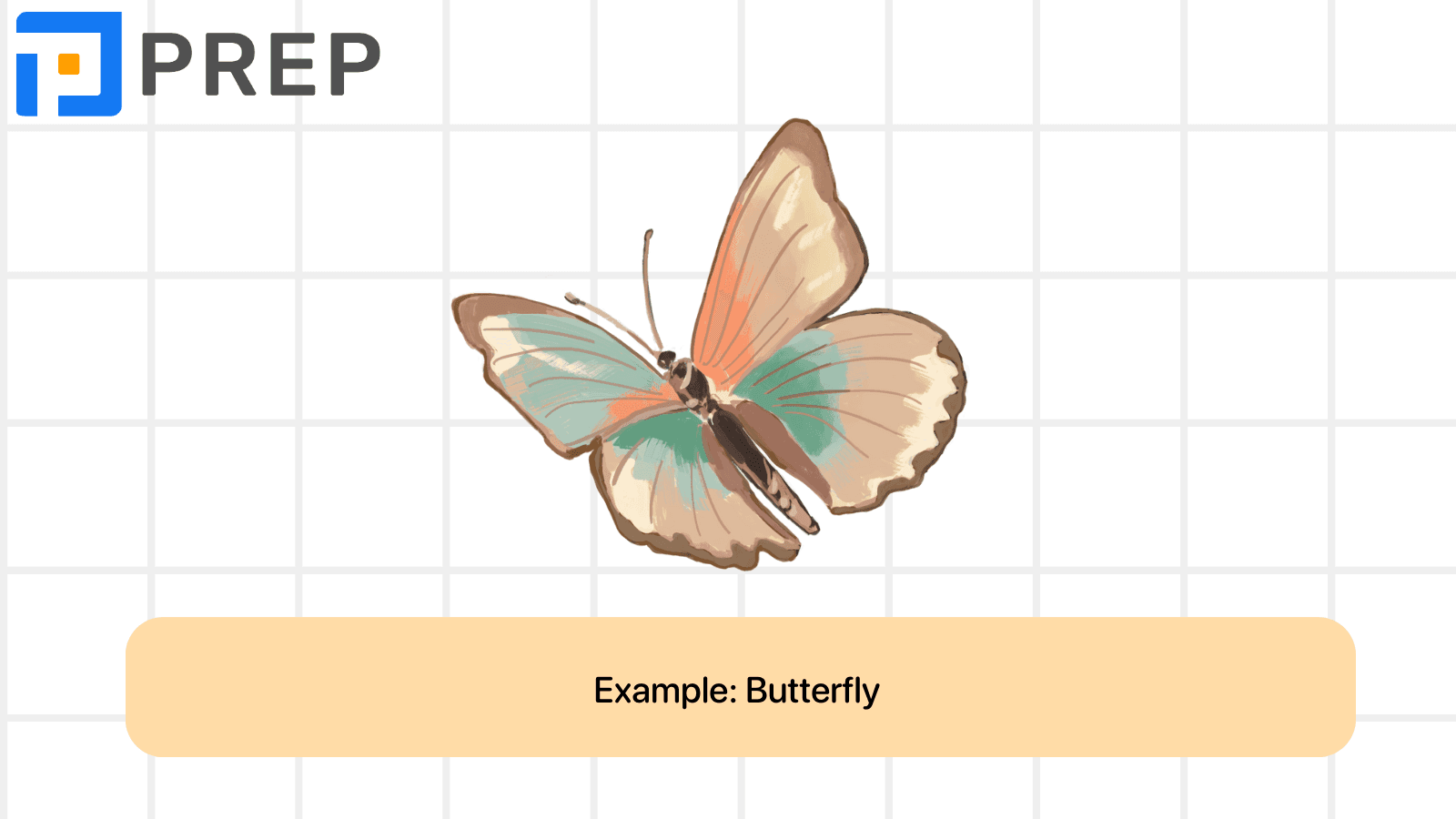
|
A2 vocabulary: Animals |
|
| Insect (n) | Fur (n) |
| Beetle (n) | Eagle (n) |
| Butterfly (n) | Nest (n) |
| Camel (n) | Octopus (n) |
| Creature (n): a living thing, real or imaginary, that can move around, such as an animal | Swan (n) |
| Dinosaur (n) | Tortoise (n) |
| Extinct (adj): (of a type of plant, animal, etc.) no longer in existence | Wild (n) |
| Tail (n) | Wing (n) |
8. Clothes
Clothes are diverse in types and styles. If you're curious about what these outfits and accessories are named in English, let's discover them promptly in the A2 vocabulary table provided by PREP below!
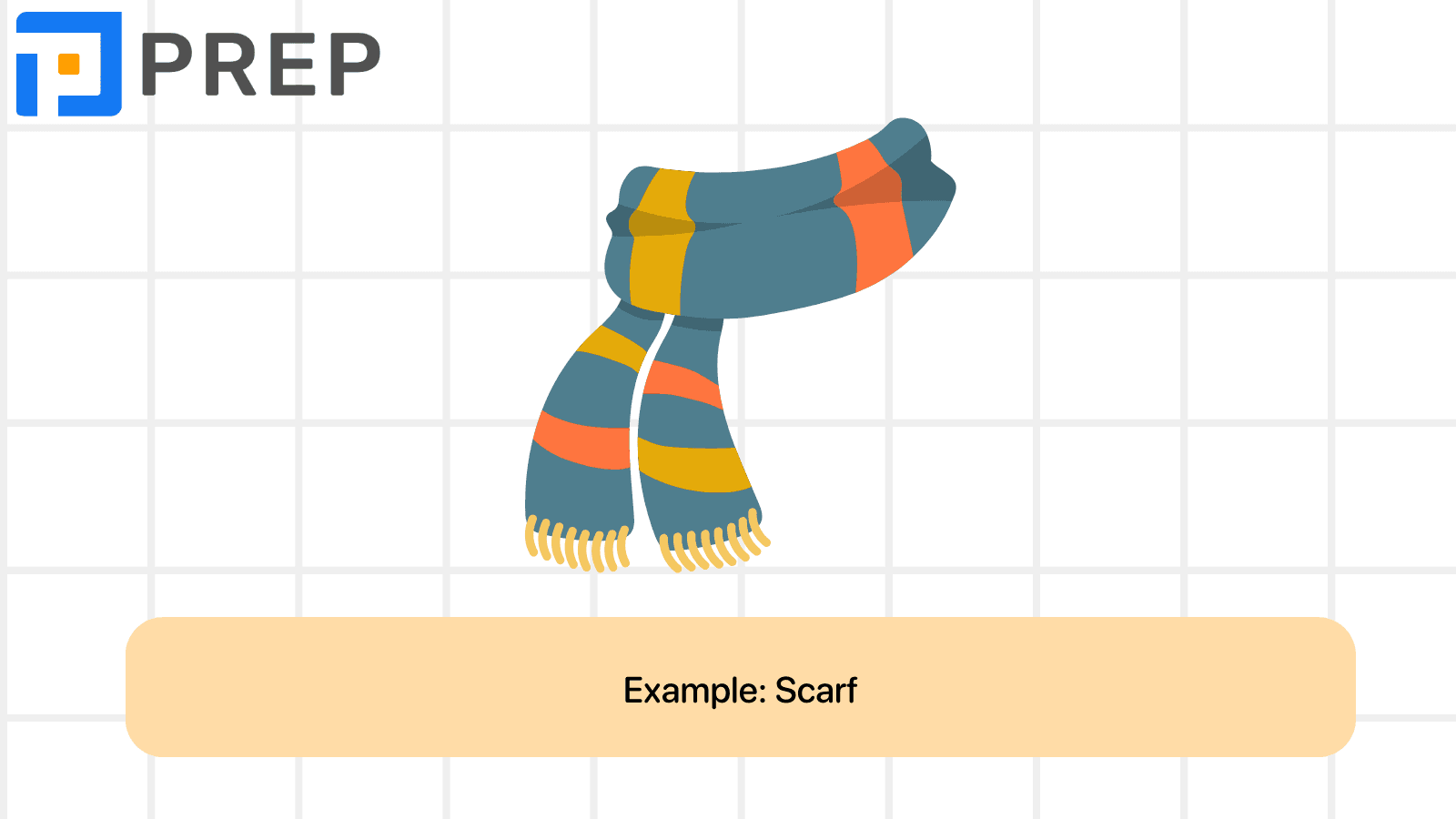
|
A2 vocabulary: Clothes |
|
| Clothing (n): clothes, especially a particular type of clothes | Shorts (n): short trousers that end above or at the knee |
| Fashion (n): a popular style of clothes, hair, etc. at a particular time or place; the state of being popular | Ring (n): a piece of jewellery that you wear on your finger, consisting of a round band of gold, silver, etc., sometimes decorated with precious stones |
| Belt (n): a long narrow piece of leather, cloth, etc. that you wear around the middle part of your body | Scarf (n): a piece of cloth that is worn around the neck or over the hair or shoulders, for example to keep warm or for decoration |
| Button (n): a small round piece of metal, plastic, etc. that is sewn onto a piece of clothing and used for fastening two parts together | Sock (n): a piece of clothing that is worn over the foot, ankle and lower part of the leg, especially inside a shoe |
| Handbag (n): a small bag for money, keys, etc., especially one carried by a woman | Suit (n): a set of clothes made of the same cloth, including a jacket and trousers or a skirt |
| Purse (n): a small bag made of leather, plastic, etc. for carrying coins and often also paper money, cards, etc., used especially by women | Sunglasses (n): a pair of glasses with dark glass in them that you wear to protect your eyes from bright light from the sun |
| Wallet (n): a small, flat, folding case made of leather or plastic used for keeping paper money and credit cards in | Trainer (n): a shoe that you wear for sports or as informal clothing |
| Jewelry (n): objects such as rings and necklaces that people wear as decoration | Uniform (n): the special set of clothes worn by all members of an organization or a group at work, or by children at school |
| Tie (n): to attach or hold two or more things together using string, rope, etc.; to fasten somebody/something with string, rope, etc. | Pants (n): Pants |
9. School
School is always a popular topic in English vocabulary. Let's explore together with PREP to see what A2 vocabulary related to school is!
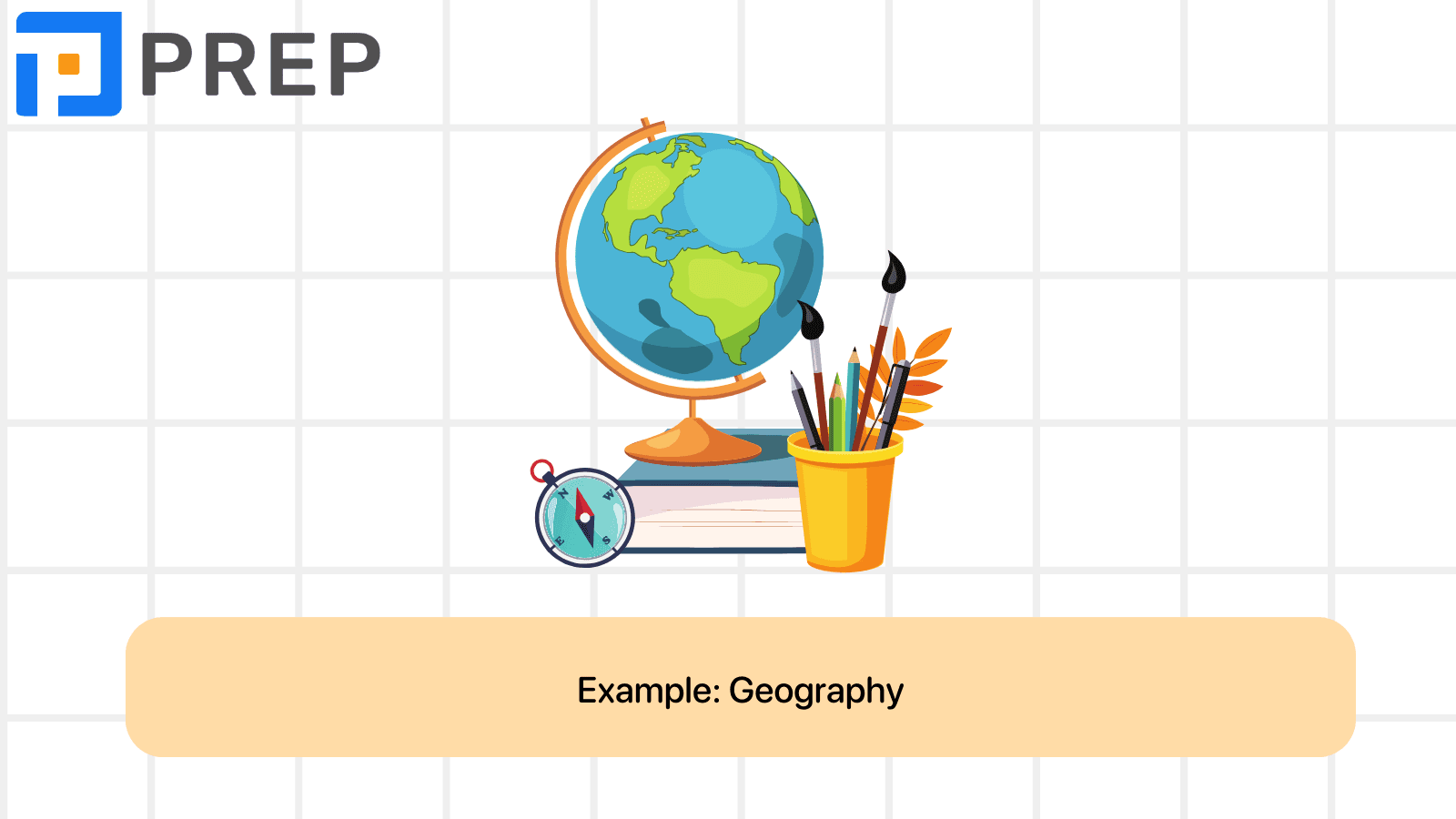
|
A2 vocabulary: School |
|
| Art (n): the use of the imagination to express ideas or feelings, particularly in painting, drawing or sculpture | History (n): all the events that happened in the past |
| Backpack (n): a bag that you carry on your back, made of strong material and often used by people who go climbing or walking | Language (n): the system of communication in speech and writing that is used by people of a particular country or area |
| Bin (n): a container that you put waste in | Math (n): mathematics, especially as a subject in school |
| Club (n): an organization for people who share an interest or do a sport or activity together | Geography (n): the scientific study of the earth’s surface, physical features, divisions, products, population, etc. |
| College (n): a place where students go to study or to receive training after they have left school | Project (n): a piece of work involving careful study of a subject over a period of time, done by school or college students |
| Competition (n): an event in which people compete with each other to find out who is the best at something | Rucksack (n): a bag that you carry on your back, made of strong material and often used by people who go climbing or walking |
| Dictionary (n): a book or electronic resource that gives a list of the words of a language in alphabetical order and explains what they mean, or gives a word for them in a foreign language | Science (n): knowledge about the structure and behaviour of the natural and physical world, based on facts that you can prove, for example by experiments |
| Flag (n): a piece of cloth with a special coloured design on it that may be the symbol of a particular country or organization, may be used to give a signal or may have a particular meaning. A flag can be attached to a pole (= a long thin straight piece of wood or metal) or held in the hand. | Scissors (n): a tool for cutting paper or cloth that has two sharp blades (= cutting edges) with handles, joined together in the middle |
| Online (n): available on or done using the internet or other computer network | Screen (n): the flat surface at the front of a television, computer, or other electronic device, on which you see pictures or information |
| Glue (n): a sticky substance that is used for joining things together | Student (n): a person who is studying at a university or college |
| Group (n): a number of people or things that are together in the same place or that are connected in some way | Study (n): the activity of learning or gaining knowledge, either from books or by examining things in the world |
| Gym (n): a room or hall with equipment for doing physical exercise, for example in a school | Pupil (n): a person who is being taught, especially a child in a school |
| Offline(n): not directly controlled by or connected to a computer or to the internet | Subject (n): an area of knowledge studied in a school, college, etc. |
| Timetable (n): a chart showing the times at which trains, buses and planes leave and arrive | |
10. Sports & Leisure
Sports are an indispensable topic in English vocabulary. What A2 vocabulary specifically names recreational sports? Below, PREP has collected and compiled a list for you to refer to!
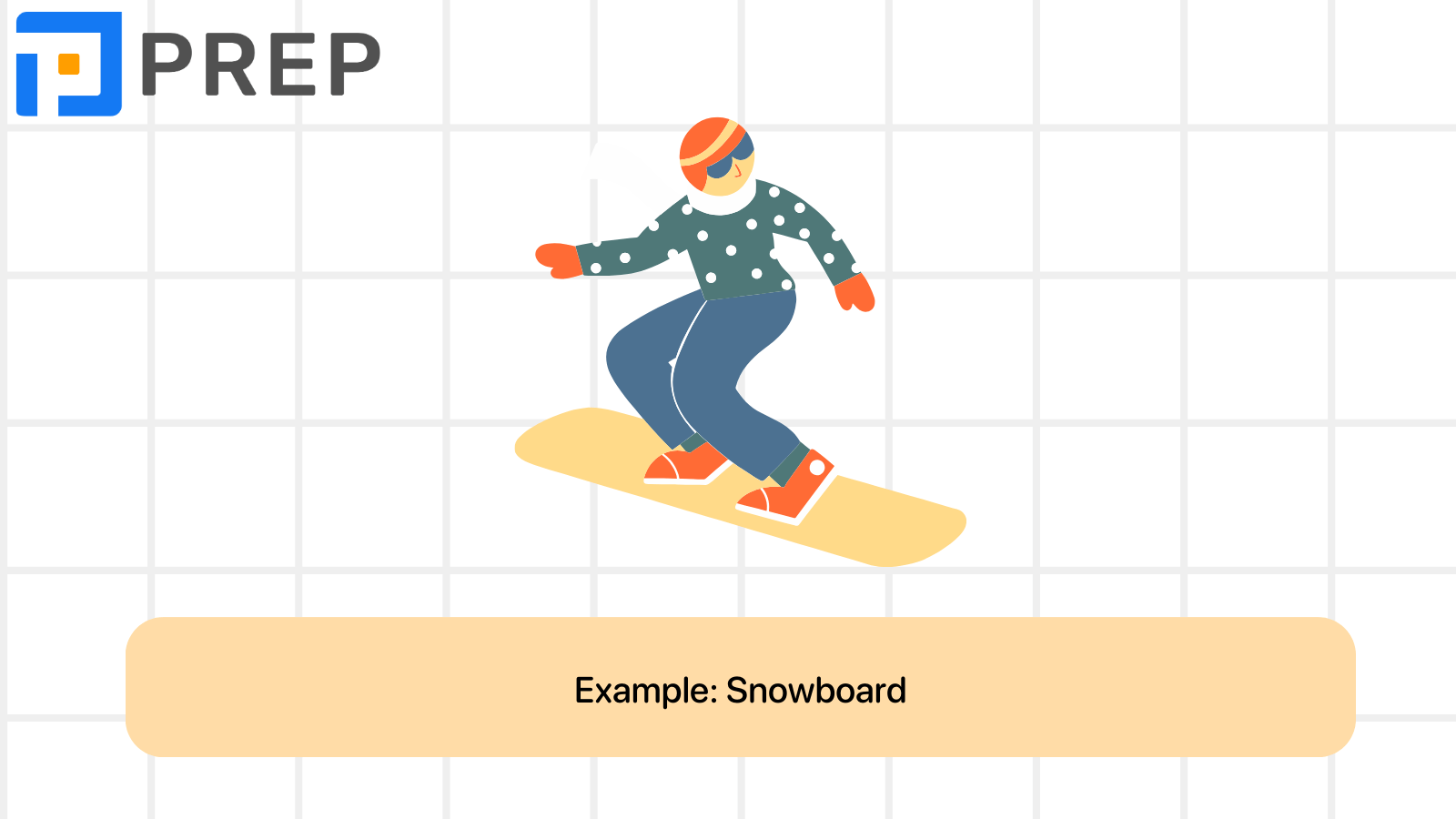
|
A2 vocabulary: Sports & Leisure |
|
| Rucksack (n): a bag that you carry on your back, made of strong material and often used by people who go climbing or walking | Snowball (n): a ball that you make out of snow to throw at somebody/something in a game |
| Suitcase (n): a case with flat sides and a handle, used for carrying clothes, etc. when you are travelling | Snowboard (n): a long wide board that a person stands on to move over snow in the sport of snowboarding |
| Cartoon (n): a humorous drawing in a newspaper or magazine, especially one about politics or events in the news | Team (n): a group of people who play a particular game or sport against another group of people |
| Channel (n): a television station | Stage (n): a raised area, usually in a theatre, etc. where actors, dancers, etc. perform |
| Chess (n): a game for two people played on a board marked with black and white squares on which each playing piece (representing a king, queen, castle, etc.) is moved according to special rules. The aim is to put the other player’s king in a position from which it cannot escape (= to checkmate it). | Tent (n): a shelter made of a large sheet of canvas, nylon, etc. that is supported by poles and ropes fixed to the ground, and is used especially for camping |
| Collect (n): using a system in which a phone call is paid for by the person who receives it | Umbrella (n): an object with a round folding frame of long, straight pieces of metal covered with material, that you use to protect yourself from the rain or from hot sun |
| Concert (n): a public performance of music | Violin (n): a musical instrument with strings, which you hold under your chin and play with a bow |
| Drum (n): a musical instrument made of a hollow round frame with plastic or skin stretched tightly across one or both ends. You play it by hitting it with sticks or with your hands. | Winner (n): a person, a team, an animal, etc. that wins something |
| Festival (n): a series of performances of music, plays, films, etc., usually organized in the same place once a year; a series of public events connected with a particular activity or idea | Train (n): a number of connected coaches or trucks, pulled by an engine or powered by a motor in each one, taking people and goods from one place to another |
| Flashlight (n): a small electric lamp that you can hold in your hand and carry with you | American football (n): a game played by two teams of 11 players, using an oval ball that players kick, throw, or carry. Teams try to put the ball over the other team’s line. |
| Golf (n): a game played over a large area of ground using sticks with a special shape to hit a small hard ball (a golf ball) into a series of 9 or 18 holes, using as few shots as possible | Baseball (n): a game played especially in the US by two teams of nine players, using a bat and ball. Each player tries to hit the ball and then run around four bases before the other team can return the ball. |
| Hotel (n): a building where people stay, usually for a short time, paying for their rooms and meals | Basketball (n): a game played by two teams of five players, using a large ball which players try to throw into a high net hanging from a ring |
| Instrument (n): an object used for producing musical sounds, for example a piano or a drum | Cricket (n): a game played on grass by two teams of 11 players. Players score points (called runs) by hitting the ball with a wooden bat and running between two sets of vertical wooden sticks, called stumps. |
| Invitation (n): a spoken or written request to somebody to do something or to go somewhere | Hockey (n): a game played on a field by two teams of 11 players, with curved sticks and a small hard ball. Teams try to hit the ball into the other team’s goal. |
| Join (v): to fix or connect two or more things together | Soccer (n): a game played by two teams of 11 players, using a round ball which players kick up and down the playing field. Teams try to kick the ball into the other team’s goal. |
| Magazine (n): a type of large thin book with a paper cover that you can buy every week or month, containing articles, photographs, etc., often on a particular topic; a similar collection of articles, etc. that appears regularly online | Table tennis (n): a game played like tennis with bats and a small plastic ball on a table with a net across it |
| Match (football) (n): a sports event where people or teams compete against each other | Volleyball (n): a game in which two teams of six players use their hands to hit a large ball backwards and forwards over a high net while trying not to let the ball touch the ground on their own side |
| Meet (v): to be in the same place as somebody by chance and talk to them | Winter sports (n): sports that people do on snow or ice |
| Member (n): a person, an animal or a plant that belongs to a particular group | Diving (n): the sport or activity of diving into water with your head and arms first |
| Contest (n): a competition in which people try to win something | Sailing (n): the sport or activity of travelling in a boat with sails |
| Pop music (n): popular music of the sort that has been popular since the 1950s, usually with a strong rhythm and simple tunes, often contrasted with rock, soul and other forms of popular music | Quiz (n): a competition or game in which people try to answer questions to test their knowledge |
| Prize (n): an award that is given to a person who wins a competition, race, etc. or who does very good work | Race (n): a competition between people, animals, vehicles, etc. to see which one is the faster or fastest |
| Programme (n): something that people watch on television or listen to on the radio | Rock music (n): a type of loud popular music, developed in the 1960s, with a strong beat played on electric guitars and drums |
| Puzzle (n): a game, etc. that you have to think about carefully in order to answer it or do it | Score (n): to win points, goals, etc. in a game or competition |
| Pyramid (n): a large building with a square or triangular base and sloping sides that meet in a point at the top. The ancient Egyptians built stone pyramids as places to bury their kings and queens. | Ski (v): to move over snow on skis, especially as a sport |
| Work out (phrase): to train the body by physical exercise | Sledge (n): a vehicle for travelling over snow and ice, with long narrow pieces of wood or metal instead of wheels. Larger sledges are pulled by horses or dogs and smaller ones are used for going down hills as a sport or for pleasure. |
See more articles:
- A complete and accurate collection of B1 vocabulary by topic
- A complete collection of English A1 vocabulary organized by topic
II. Download the PDF file of A2 vocabulary
For convenient revision, PREP has gathered A2 vocabulary from the Cambridge Dictionary into a PDF file for easier download and practice. Let's diligently practice together with PREP!
III. Exercises on A2 vocabulary & Detailed answers
Exercise: Arrange the A2 vocabulary into the appropriate topic:
|
Family |
Clothes |
Animals |
|
Cushion, Diary, Pants, Shorts, Insect, Beetle, Entrance, Gate, Key, Wallet, Jewelry, Tie, Butterfly, Camel, Creature. |
||
Answer keys:
|
Family |
Clothes |
Animals |
|
Cushion Diary Entrance Gate Key |
Wallet Jewelry Tie Pants Shorts |
Insect Beetle Butterfly Camel Creature |
IV. From Beginner to Band 7+
Hopefully, this article from PREP will help you grasp the entire A2 vocabulary. If you want to start your IELTS journey with our expert tips, check out PREP's study plans below:
👉 IELTS preparation course: Break Barriers, Achieve Band 7+

Hi I'm Chloe, and I am currently serving as an Product Content Administrator at Prep Education. With over five years of experience in independent online IELTS study and exam preparation, I am confident in my ability to support learners in achieving their highest possible scores.
Comment
Premium content
View allPersonalized roadmap
Most read












